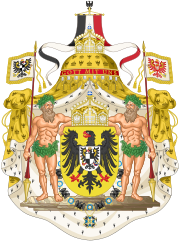
Frederick William II was king of Prussia from 1786 until his death in 1797. He was in personal union with the prince-elector of Brandenburg and sovereign prince of the Canton of Neuchâtel. As a defensive reaction to the French Revolution, Frederick William II ended the German Dualism between Prussia and Austria. Domestically, he turned away from the enlightened style of government of his predecessor and introduced a tightened system of censorship and religious control. The king was an important patron of the arts especially in the field of music. As a skilled cellist he enjoyed the dedication of various cello-centric compositions by composers Mozart, Haydn, Boccherini, and Beethoven. He was also responsible for some of the most notable architecture in Prussia, including the Brandenburg Gate in Berlin, the Marble Palace, and Orangery in the New Garden, Potsdam.

Prince Frederick Henry Ludwig of Prussia was a Prussian general, statesman, and diplomat. He was a son of King Frederick William I of Prussia and Princess Sophia Dorothea of Hanover, and the younger brother of Frederick the Great. Prince Henry led Prussian armies in the Silesian Wars and the Seven Years' War, having never lost a battle in the latter. In 1786, he was suggested as a candidate to be a monarch in the United States.

Louisa Ulrika of Prussia, born 24 July, 1720 in Berlin, died 16 July, 1782 at Svartsjö Palace, was Queen of Sweden 1751-1771. She was married to King Adolf Frederick and she was queen mother during the reign of King Gustav III.

Princess Anna Amalia of Prussia was an early modern German composer and music curator who served as princess-abbess of Quedlinburg. She was a princess of Prussia as the daughter of Frederick William I of Prussia and the sister of Frederick the Great.

Prince Friedrich Wilhelm Karl of Prussia was the son of Frederick William II of Prussia and Frederika Louisa of Hesse-Darmstadt.
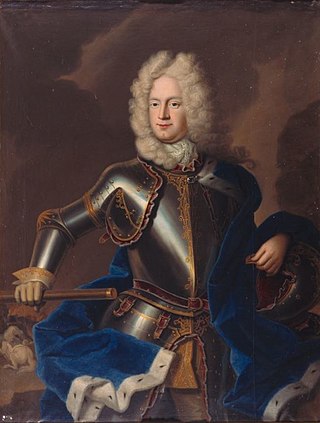
Ferdinand Albert, Duke of Brunswick-Lüneburg, was an officer in the army of the Holy Roman Empire. He was prince of Wolfenbüttel during 1735.
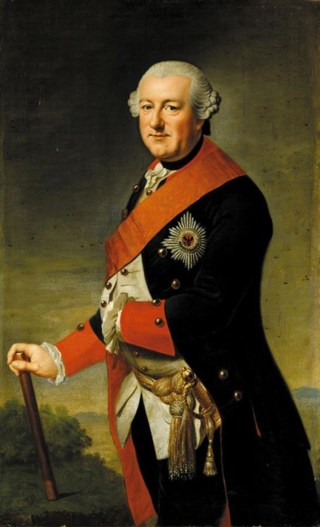
Charles, Duke of Brunswick-Lüneburg, reigned as Prince of Brunswick-Wolfenbüttel from 1735 until his death.

Frederica Louisa of Hesse-Darmstadt was Queen of Prussia and Electress of Brandenburg as the second wife of King Frederick William II.

Duchess Luise of Brunswick-Wolfenbüttel was daughter of Ferdinand Albert II, Duke of Brunswick-Wolfenbüttel and his wife Duchess Antoinette of Brunswick-Wolfenbüttel.

Princess Wilhelmina of Prussia was the consort of William V of Orange and the de facto leader of the dynastic party and counter-revolution in the Netherlands. She was the daughter of Prince Augustus William of Prussia and Duchess Luise of Brunswick-Wolfenbüttel. Wilhelmina was the longest-serving princess consort of Orange.

Prince Augustus Ferdinand of Prussia was a Prussian prince and general, as well as Herrenmeister of the Bailiwick of Brandenburg of the Order of Saint John. He belonged to the House of Hohenzollern, and was the youngest son of Frederick William I of Prussia by his wife, Queen Sophia Dorothea.
Wilhelmine of Prussia, Wilhelmine von Preußen in German, may refer to:
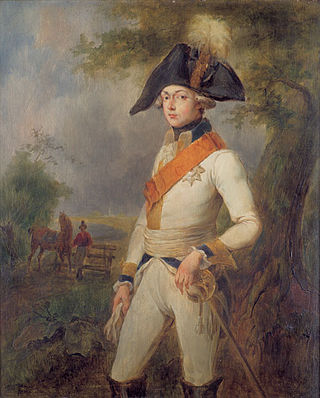
Prince Frederick Louis Charles of Prussia was the second son and third child of Frederick William II of Prussia and Frederika Louisa of Hesse-Darmstadt.

Princess Friederike Luise of Prussia was a daughter of Frederick William I of Prussia and Sophia Dorothea of Hanover and Margravine of Brandenburg-Ansbach.

Princess Sophia Dorothea of Prussia was the ninth child and fifth daughter of Frederick William I of Prussia and Sophia Dorothea of Hanover. By marriage, she was a Margravine of Brandenburg-Schwedt.

Frederick William of Brandenburg-Schwedt was a German nobleman. In his lifetime, from 1711 to 1771, he held the titles Prince in Prussia and Margrave of Brandenburg, with the style Royal Highness. He was made a knight of the Order of the Black Eagle.
Princess Frederica or Princess Frederika may refer to:

Princess and Margravine Anna Elisabeth Louise of Brandenburg-Schwedt was a Prussian princess by marriage to her uncle Prince Augustus Ferdinand of Prussia. She was a daughter of Margrave Frederick William of Brandenburg-Schwedt and Princess Sophia Dorothea of Prussia.
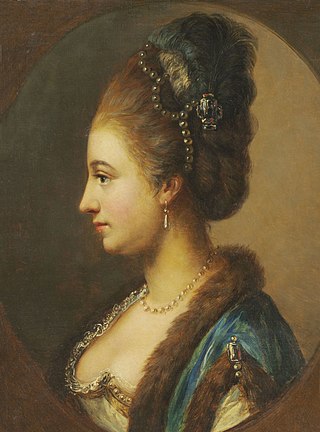
Margravine Philippine Auguste Amalie of Brandenburg-Schwedt was a Landgravine consort of Hesse-Kassel by marriage to Frederick II, Landgrave of Hesse-Cassel.

Duke Eugen of Württemberg was a German prince. He was the brother of Frederick I of Württemberg.

